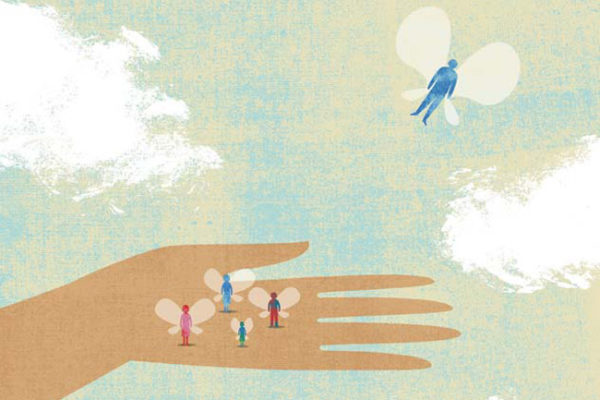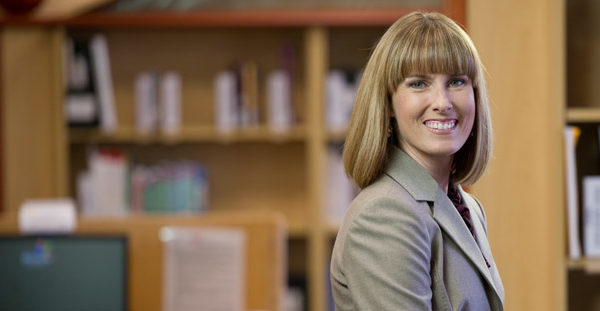Frailty? Tai Chi? Constipation?

School of Nursing faculty-led programs teach seniors like Debbra Lynn Cherry (center) to use what they learn to improve their health and know what to discuss with their health providers. Photo by Daniel Dubois.
This wasn’t the kind of library they remembered from their childhood. The group of 14 older adults were enjoying a meal of seafood cannelloni, salad and cupcakes as sunshine beamed on the stacks of books just outside the room. Speaking above a whisper and asking questions was encouraged.
They came to the Edmondson Pike Library in South Nashville for Senior Medical University 101, a monthly series of medical topics presented by the Vanderbilt University School of Nursing (VUSN) Center for Gerontological Nursing Excellence. The seniors themselves pick the topics; past ones have included “Diabetes Self Care,” “Reversible Causes of Memory Loss,” “Constipation” and “Benefits of Tai Chi.”
VUSN faculty take turns directing the class, addressing some of the top medical needs for Middle Tennessee: promoting wellness and preventing disease. The free program is a partnership between VUSN, the Nashville Public Library, which provides space, and Elmcroft of Brentwood Senior Living, which provides lunch each month.
In October 2017, the topic was “Aging and Frailty,” presented by Cathy Maxwell, PhD’12, RN, assistant professor of Nursing, who researches outcome trajectories of older adults after physical injury, often caused by a fall. She would like to prevent that from happening. Her research benefits from the seniors, and the seniors benefit from her research.
“My whole goal,” she told the group, “is to help people understand what’s happening in their bodies as they age so that they can be more informed and make better decisions to improve the quality of their lives.”
In her presentation, she demonstrated how the human body’s ability to make energy peaks around age 30 and begins to decline by about .5 percent to 1 percent per year until the end of life. “We call it frailty, physical frailty,” she said. “It’s the slow loss of strength and energy over time. It occurs in every aging adult. It eventually occurs in everyone. It leads to falls and other problems over time.”
To illustrate how frailty can have life-altering consequences, Maxwell shared the results of a study that followed 188 people age 65 and older who were admitted to Vanderbilt University Medical Center for an injury. The research tracked the outcomes of the adults for one year. For non-frail patients, 6.5 out of 10 people returned to the health they were before injury. For frail patients, however, only two out of 10 people returned to their baseline health, and four out of 10 died.
“You can see from these results why it’s so important to prevent falls in the first place,” she said.
When people fall, their ability to bounce back is determined by their body’s ability to generate energy for recovery, along with other factors, Maxwell said. But frailty is not destiny. By incorporating physical activity and exercise into daily routines, seniors can live longer and retain a higher physical capacity until shortly before the end of life.
Maxwell’s talk was peppered with lots of questions from the audience. For example: “Is frailty the same thing as osteoporosis?” “No, not exactly,” Maxwell said.
“If I’m supposed to drink a lot of water, do other types of fluids count?” “Yes, but watch caffeine and sugar intake,” Maxwell said.
The audience, which includes several “regulars,” is always appreciative.
“I think what I like most is that it’s in layman’s terms, that it’s not above your head,” said Claudette Laney, 71, of Nashville.
Debbra Cherry, 71, of Nashville, loves the instructors. “They tell me what to ask the doctor. I went through a bunch of operations and I never thought to ask my doctors one question. I know to ask, ‘What is this? Why am I taking it? Will this drug interact with other drugs?’
“Everybody we’ve had has been so kind to us.”
Linda Beuscher, PhD, MSN’96, GNP, FNAP, who directs the program, said seniors are able to ask questions at the sessions that they might not ask their medical providers. “When older people come to the doctor’s office for a visit, they don’t have time to really ask a lot of questions,” said Beuscher, assistant professor of Nursing. “And they are very curious. They really want to know a lot about health and what to expect and have many, many questions. We’re able to provide that information through a series of topics.”
Senior Medical University 101 is important for several reasons, said Syreeta Washington, supervisor of Adult and Young Adult Services at the Edmondson Pike branch of the Nashville Public Library. “It fosters lasting partnerships between community organizations while focusing on the forgotten and taboo topics that affect aging seniors,” she said. “This program also offers a safe haven for seniors to educate themselves amongst peers who have encountered or know someone who has faced issues, in a judgment-free zone. What I love the most about SMU 101 is the seniors leave feeling loved, appreciated and not forgotten in our community. That to me is the best expression of value.”
The monthly class is just one way the gerontology faculty increase health awareness while benefiting the community; faculty also reach out to senior centers, churches, low-income housing sites, and YMCA branches. “Collectively, we have probably presented 40 to 50 times in the past year,” Maxwell said. “We are so fortunate to have a core of faculty with such expertise.”
Senior Medical University 101 was the brainchild of Todd Monroe, PhD, FAAN, FNAP, FGSA, assistant professor of Nursing and Medicine. In 2013, he submitted an application for VUSN to become a Hartford Center of Gerontological Nursing Excellence. The application was successful and led to the eventual formation of the Vanderbilt Center for Gerontological Nursing Excellence, which allowed VUSN to increase community outreach.
He co-developed Senior Medical University 101 with Tina Lamaison, executive director of Elmcroft of Brentwood. “My partnership with Tina has led to five years of successful implementation of Senior Medical University 101,” he said. “With the tremendous growth of Nashville, we plan for increased advertisement and hope the program will continue to thrive.”
by Matt Batcheldor







